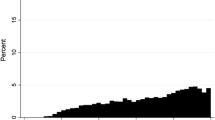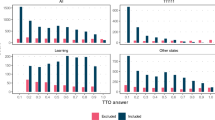Abstract
The capability approach advocates that interpersonal comparisons be made in the space of functionings and capabilities. However, Amartya Sen has not specified which capabilities should be selected as the relevant ones. This has provoked two types of criticism. The stronger critique is Martha Nussbaum’s claim that Sen should endorse one specific list of relevant capabilities. The weaker claim is that some systematic methodological reasoning should be conducted on how such a selection could be done. I will first suggest that Nussbaum’s claim can be better understood by looking at some of the core differences between her and Sen’s version of the capability approach. Then I will argue against the use of Nussbaum’s list for quality of life measurement on grounds of epistemology and legitimacy. However, procedural methods also have their problems, notably the danger of selection biases. The paper concludes by sketching one possible way to minimize such biases and by briefly discussing a set of methods for the selection of capabilities for quality of life measurement.
Similar content being viewed by others
References
S. Alkire (2002) Valuing Freedoms. Sen’s Capability Approach and Poverty Reduction Oxford University Press New York
E. Anderson (1999) ArticleTitleWhat is the point of equality? Ethics 109 287–337 Occurrence Handle10.1086/233897
L. Barclay (2003) ArticleTitleWhat kind of liberal is Martha Nussbaum? Sats: Nordic Journal of Philosophy 4 IssueID2 5–24
D. Bubeck (1995) Care, Gender and Justice Clarendon Press Oxford
T. Burchardt (2004) ArticleTitleCapabilities and disability: The capabilities framework and the social model of disability Disability and Society 19 IssueID7 735–751 Occurrence Handle10.1080/0968759042000284213
Charusheela, S.: 2004, Ethnocentric Modernism in Development Frameworks: A Limit to Martha Nussbaum’s Universalist Ethics, Mimeo (University of Hawa’I at Manoa).
E. Chiappero-Martinetti (2003) Unpaid work and household well-being: a non-monetary assessment A. Picchio (Eds) Unpaid Work and the Economy. A Gender Analysis of the Standards of Living Routledge London
D. Cornell (2004) Defending Ideals Routledge New York
D. Crocker (2004) Deliberating Democracy: Ethics, Capability, and Democracy University of Maryland mimeo
M. Deveaux (2002) ArticleTitlePolitical morality and culture: what difference do differences make? Social Theory and Practice 28 IssueID3 503–518
J. Drèze A. Sen (2002) India: Development and Participation Oxford University Press Oxford
R. Erikson R. Åberg (1987) Welfare in Transition A Survey of Living Conditions in Sweden, 1968–1981 Clarendon Press Oxford
N. Folbre (1994) Who Pays for the Kids? Gender and the Structures of Constraint Routledge New York
S. Fukuda-Parr (2003) ArticleTitle‘The human development paradigm: Operationalizing Sen’s ideas on capabilities Feminist Economics 9 IssueID2/3 301–317 Occurrence Handle10.1080/1354570022000077980
D. Gasper I. Staveren Particlevan (2003) ArticleTitleDevelopment as freedom – and as what else? Feminist Economics 9 IssueID2/3 137–161 Occurrence Handle10.1080/1354570032000078663
A. Jagger (2002) ArticleTitleChalleging women’s global inequalities: Some priorities for Western philosophers Philosophical Topics 30 IssueID2 229–252
R. Kapur (2001) ArticleTitleImperial parody Feminist Theory 2 IssueID1 79–88 Occurrence Handle10.1177/14647000122229389
Kuklys, W.: 2004, Amartya Sen’s Capability Approach: Theoretical Insights and Empirical Applications (Unpublished PhD dissertation, Cambridge University)
Kuklys, W. and I. Robeyns: 2004, ‘Sen’s capability approach to welfare economics’, Cambridge Working Papers in Economics 0415, Cambridge University
N. Menon (2002) ArticleTitleUniversalism without foundations? Economy and Society 31 IssueID1 152–169 Occurrence Handle10.1080/03085140120109295
Nussbaum, M.: 1988, ‘Nature, functioning and capability: Aristotle on political distribution’, Oxford Studies in Ancient Philosophy, Supplementary Volume, pp. 145–184
M. Nussbaum (2000) Women and Human Development The Capabilities Approach Cambridge University Press Cambridge
M. Nussbaum (2003) ArticleTitleCapabilities as fundamental entitlements: Sen and social justice Feminist Economics 9 IssueID2/3 33–59 Occurrence Handle10.1080/1354570022000077926
S. Okin (1989) Justice, Gender and the Family Basic Books New York
S. Okin (2003) ArticleTitlePoverty, well-being, and gender: What counts, who’s heard? Philosophy & Public Affairs 31 IssueID3 280–316
J. Rawls (1993) Political Liberalism Columbia University Press New York
S. Reddy T. Pogge (2003) How Not to Count the Poor Columbia University mimeo
Robeyns, I.: 2000, ‘An unworkable idea or a promising alternative? Sen’s capability approach re-examined,’ Center for Economic Studies Discussion paper 00.30, (Katholieke Universiteit Leuven)
Robeyns, I. 2002, Gender Inequality: A Capability Perspective (Unpublished PhD dissertation, Cambridge University)
I. Robeyns (2003) ArticleTitleSen’s capability approach and gender inequality: selecting relevant capabilities Feminist Economics 9 IssueID2/3 61–92 Occurrence Handle10.1080/1354570022000078024
I. Robeyns (2005) ArticleTitleThe capability approach: a theoretical survey Journal of Human Development 6 IssueID1 93–114 Occurrence Handle10.1080/146498805200034266
J. Roemer (1996) Theories of Distributive Justice Harvard University Press Cambridge
A. Sen (1980) Equality of what? S. McMurrin (Eds) The Tanner Lectures on Human Values University of Utah Press Salt Lake City
A. Sen (1984) ArticleTitleThe living standard Oxford Economic Papers 36 74–90
A. Sen (1985a) Commodities and Capabilities North Holland Amsterdam
A. Sen (1985b) ArticleTitleWell-being, agency and freedom The Journal of Philosophy LXXXII IssueID4 169–221
A. Sen (1987) The standard of living G. Hawthorn (Eds) The Standard of Living Cambridge University Press Cambridge
A. Sen (1992) Inequality Re-examined Clarendon Press Oxford
A. Sen (1993) Capability and well-being M. Nussbaum A. Sen (Eds) The Quality of Life Clarendon Press Oxford
A. Sen (1997) ArticleTitleMaximization and the act of choice Econometrica 65 IssueID4 745–779 Occurrence HandleMR1458430
A. Sen (1999) Development as Freedom Knopf New York
A. Sen (2004) ArticleTitleCapabilities, lists, and public reason Feminist Economics 10 IssueID3 77–80 Occurrence Handle10.1080/1354570042000315163
F. Stewart (2001) ArticleTitleBook review of women and human development by Martha Nussbaum Journal of International Development 13 1189–1202 Occurrence Handle10.1002/jid.773
R. Sugden (1993) ArticleTitleWelfare, resources and capabilities: A review of inequality re-examined by Amartya Sen Journal of Economic Literature XXXVI 1947–1962
M. Tea (2003) Introduction M. Tea (Eds) Without a Net. The Female Experience of Growing Up Working Class Seal Press Emeryville, CA
E. Unterhalter (2003) ArticleTitleThe capabilities approach and gendered education. An examination of South African complexities Theory and Research in Education 1 IssueID1 7–22 Occurrence Handle10.1177/1477878503001001002
B. Williams (1987) The standard of living: interests and capabilities G. Hawthorn (Eds) The Standard of Living Cambridge University Press Cambridge
Author information
Authors and Affiliations
Corresponding author
Rights and permissions
About this article
Cite this article
Robeyns, I. Selecting Capabilities for Quality of Life Measurement. Soc Indic Res 74, 191–215 (2005). https://doi.org/10.1007/s11205-005-6524-1
Issue Date:
DOI: https://doi.org/10.1007/s11205-005-6524-1




